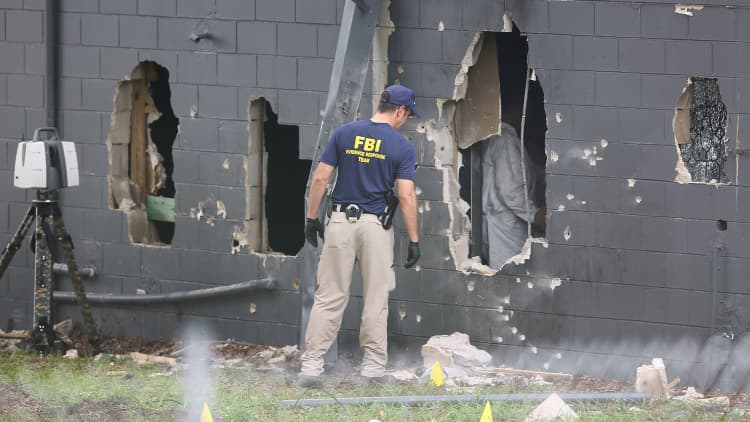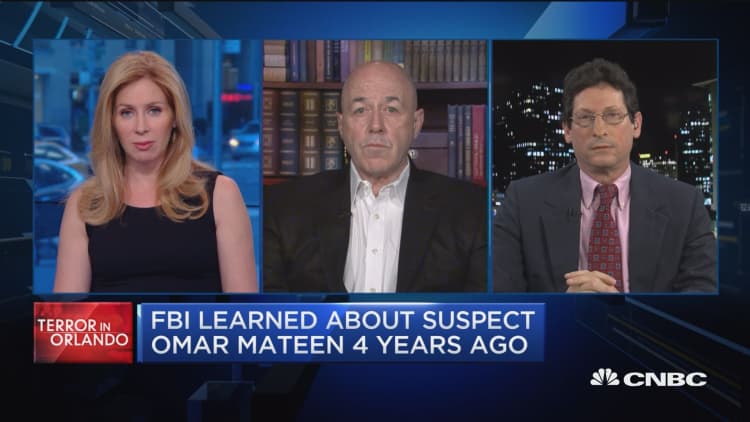
Americans examined by the FBI over alleged terrorism concerns should be flagged when purchasing firearms, retired ATF Special Agent Jim Cavanaugh said Monday, after it was revealed the shooter in the Orlando gay nightclub rampage was interviewed twice by federal authorities in 2013 for making "inflammatory" comments about radical Islamic propaganda.
American-born Omar Mateen used a legally purchased AR-15-style weapon in the massacre that left 49 other people dead at the Pulse nightclub in Orlando, Florida, early Sunday — the worst mass shooting in U.S. history. Mateen also was killed.
"Here's a glaring example, let's make sure anybody who came to the interest of the Joint Terrorism Task Force for whatever reason, even if the file was closed, if they're going to be buying a firearm and lots of ammunition ... [we should] know that," Cavanaugh told CNBC's "Squawk Box."
"We're not going to arrest the guy. We're not going to kick his door in. Just want to know, tell us he's buying a gun today," he continued. "It took a week for him to then kill. ... We can tighten that up through process. But it doesn't mean we can arrest him."
Mateen had security and firearm licenses. Law enforcement sources told NBC News the 29-year-old swore allegiance to the leader of ISIS in a 911 call moments before the attack.

Bernard Kerik, former New York City police commissioner, agreed with Cavanaugh, expressing shock Mateen was able to buy guns with no "flagging mechanism" to federal or local authorities.
Kerik said it's one thing to investigate alleged terror connections, but it's another to keep on top of previously interviewed individuals. "There's no consistent follow-up," he added, suggesting local authorities could help keep tabs of people who were of interest to the feds.
"We have ticking time bombs of people who are inspired but not necessarily directed by this nefarious terrorist group," said Brian Levin, criminal justice professor at California State University, San Bernardino.
San Bernardino was where 14 people were killed in the December attack by a husband and wife team, who also used AR-15-type assault rifles and other weapons.
"Even if you consider the Second Amendment to be a fundamental right ... it can be regulated. And there are reasonable regulations including wait periods ... and issues with magazine size," Levin said.
Cavanaugh said limiting capacity of ammunition magazines was the most effective part of the 10-year 1994 federal assault weapons ban signed into law by then-President Bill Clinton.
"The magazine capacity back during the assault-weapons ban was limited to 10 rounds," he said. "We saw during the 10 years of the assault weapons ban that [magazine limit] was starting to have an effect as the years went by."
Michael German, former FBI counterterrorism officer and ex-policy counsel at the American Civil Liberties Union, told CNBC: "Part of the problem is ... we're looking at too many people who we really don't have a reasonable basis to be looking at."
"It diverts law enforcement resources from real threats," he said. "Our counterterrorism is constantly ringing false alarms so often that it's hard to respond and to acknowledge what is a real threat."
Frances Townsend, an advisor on Homeland Security and counterterrorism to President George W. Bush, said the failure after interviewing Mateen several times was realizing his transformation from "aspirational" and acting on the "disruption opportunity" when he bought weapons.
Florida Gov. Rick Scott, while expressing empathy for the victims and their loved ones, told CNBC Monday: "This is just absolutely terrorism. ISIS has to be destroyed."
The Republican governor told "Squawk on the Street" he declared a state of emergency Sunday in Orange County, Florida, where Orlando is located, to direct state resources to the investigation and support for the families those killed and wounded in the attack.
Scott called on President Barack Obama to do the same: "The president needs to declare a state of emergency to make sure we have all the federal resources we need."


